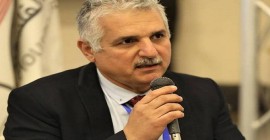Karablieh: Lending Institutions were Chosen Based on Competition and Diversity in their Specialties
After the Palestinian Fund for Employment and Social Protection (PFESP) receives financial support, lending institutions need to change their policies toward decreasing their interest rate as much as possible, in order to suite all of society’s sectors and allow them to borrow loans and start their own business projects. Consequently, this will increase the size of the labor force.
Imad Rajabi – Palestine Economy Portal
Translated by: Tamara Barakat
The philosophy of the Palestinian Fund for Employment and Social Protection (PFESP) is based on the participation of all sectors of society, including governmental, non-governmental, and private sector organizations, unions, and citizens, in order to increase employment rates in society.
Projects are funded, based on agreements made with the donors, by lending institutions chosen by the Fund. The Fund itself provides advice to project owners in order to coordinate the efforts of all sectors in society to achieve its goal of raising employment rates.
Unemployment rates among youth have increased. Last month, the Entrepreneurship and Employment Week was held. The Fund has also received 20 million euros donated by Italy, 14 million of which will be lent in order to create employment opportunities and support entrepreneurs. In this context, the Fund is being closely scrutinized, and its contributions to the youth are being questioned.
In an interview with the Palestine Economy Portal, Dr. Ziad Karablieh, the CEO of the PFESP, said that the Fund has only received $2 million in the past four years. This clearly shows the inefficiency of the Fund in reality, despite having an office in Ramallah.
Dr. Karablieh explained that the Fund was established in 2010, but its state fluctuated, which resulted in putting an end to many of its projects and downsizing its work. The Fund relies on external and internal donations, and so, it was quickly affected by the political events and the halt in donations. Moreover, the Ministry of Finance did not abide by the Palestinian Cabinet’s decision to provide it with $5 million every year. The succession of different governments also had its effect on the Fund.
Consequently, the Fund was forced to apply a policy of implementing specific projects more than individual projects, so it can benefit the largest number of people possible. Since its establishment, the Fund has contributed to employing 900 people in the West Bank and the Gaza Strip, and has provided projects to many cooperative societies. The Fund supported the Union of Cooperative Associations for Saving and Credit, providing 100 job opportunities. It has also supported entrepreneurship initiatives in cooperation with the employment councils in the governorates.
Return to Old Policy
However, this policy of implementing specific projects is being abandoned as the Fund returns to its original aim and philosophy after an Italian program donated 17 million euros to the Fund, strengthening its foundations.
Dr. Karablieh said that the Fund is coordinating with 40 organizations that are interested in entrepreneurship and youth employment. He affirmed that the role that the Fund will play with these 40 organizations is to coordinate and unite their efforts.
Methodology and Interest Rates
Even though the Fund has been designated 20 million euros, its work methodology will be to provide loans through the following five lending institutions: Faten, Asala, Ibdaa’, Vitas, and ACAD Finance. Dr. Karablieh said that any person can turn to the Fund for support and guidance on what to do and what sources to go to. However, according to the law, the Fund is obligated to deal with lending institutions and partners to support the youth. The Fund’s role is to coordinate and unite all efforts in order to create job opportunities and support entrepreneurs. “The Fund does not have sufficient financial capabilities or staff, and so it delegates these tasks to the lending institutions who have the appropriate staff, several branches all over the cities, and are able to pay for the expenses of the employees,” he said.
Moreover, the Fund has signed on agreements with five lending institutions as part of the Italian project called “Start Up Palestine,” in the presence of the Minister of Labor and the Chair of the Fund’s Board of Directors, Mamoun Abu Shahla.
Dr. Karablieh explained that the five small lending institutions were chosen based on competition, diversity in their specialties, and their match with the laws and regulations of the Monetary Authority. He stressed that it is possible to change the lending institutions if any problem occurs in their work.
Regarding the interest rate that these institutions will receive, he said that the Fund demanded that the lending institutions not deal with loans for entrepreneurship projects the same way they deal with other loans. Currently, they are discussing lowering the interest rate on projects that require huge amounts of money. There are also talks on setting the interest rate at no more than 5%.
Furthermore, he said that once financial support arrives, the Fund will agree with the lending institutions on the agenda and the targeted groups, with a special focus placed on youth.
Future Plans and Aspirations
Dr. Karablieh confirmed that the Fund will start working on a promotional program for the youth about its lending program. It also strives, under the leadership of the Minister, Mamoun Abu Shahla, to gain $100 million in the upcoming two years from companies, and international, local, and strategic donors in order to expand the current existing projects and to establish new projects.
The Fund aspires to have all the donor funds that are designated to all other entrepreneurship institutions be directed toward it, so that they can be disbursed on the largest possible number of youth entrepreneurs through the Fund’s partners and lending institutions.






